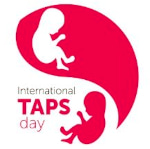International TAPS Day Date in the current year: March 3, 2026
 International TAPS Day is observed annually on March 3 to raise awareness of twin anemia polycythemia sequence (TAPS), a chronic form of unbalanced fetal transfusion in twins who share the same placenta, which results in polycythemia in one twin and anemia in the other.
International TAPS Day is observed annually on March 3 to raise awareness of twin anemia polycythemia sequence (TAPS), a chronic form of unbalanced fetal transfusion in twins who share the same placenta, which results in polycythemia in one twin and anemia in the other.Twin anemia polycythemia sequence (TAPS) is a condition that can occur in identical twin pregnancies where the twins share a placenta (monochorionic twins). It occurs when tiny, slow blood vessel connections between the twins cause an imbalance in red blood cells. One twin (the donor) receives fewer red blood cells and becomes anemic (low red blood cell count), while the other (the recipient) receives too many red blood cells, resulting polycythemia (high red blood cell count).
TAPS is sometimes considered a type of twin-to-twin transfusion syndrome (TTTS), a complication of monochorionic multiple pregnancies characterized by disproportionate blood supply between the fetuses. However, there are important differences between the two conditions. TTTS results from larger blood vessel connections and affects blood and amniotic fluid levels, while TAPS results from small blood vessel connections and affects blood quality but not volume.
TTTS is diagnosed based on differences in amniotic fluid levels, while TAPS is detected using Doppler ultrasound to measure blood flow in the twins’ brains, specifically looking at the speed of blood flow in the middle cerebral artery. This can make TAPS more difficult to detect early, while TTTS progresses more rapidly and can lead to severe dehydration in the donor twin and heart failure in the recipient twin.
Both conditions are often treated with laser surgery to close abnormal blood vessel connections. Other treatments for TAPS include blood transfusions for the anemic twin. In severe cases, early delivery may be recommended. However, if TAPS is detected early in pregnancy, expectant management the standard treatment protocol: observation and monitoring to intervene if necessary.
International TAPS Day was established in 2021 by the TAPS Support Foundation to raise awareness of TAPS among both the medical community and the general public, promote research and provide support to families affected by the condition.
The date of March 3 was chosen to commemorate two important papers on TAPS published within day of each other in March 2006. The first, by Robyrr et al, was published on March 1 and described a unique complication of TTTS laser surgery. The second paper, by Lopriore et al, was published on March 3 and gave the name to the twin anemia-polycythemia sequence.
One of the main goals of International TAPS Day is to emphasize that TAPS is a distinct condition from TTTS, with different diagnostic criteria, progression, and outcomes. Recognizing the difference between the two conditions is critical to improving their detection, treatment, and long-term care.
International TAPS Day should not be confused with World TAPS Awareness Day, which is observed annually on December 8. The latter was established by the Twin to Twin Transfusion Syndrome Foundation, which considers TAPS to be a type of TTTS.
- Category
- International Observances
- Tags
- International TAPS Day, international observances, international awareness days, twin anemia polycythemia sequence